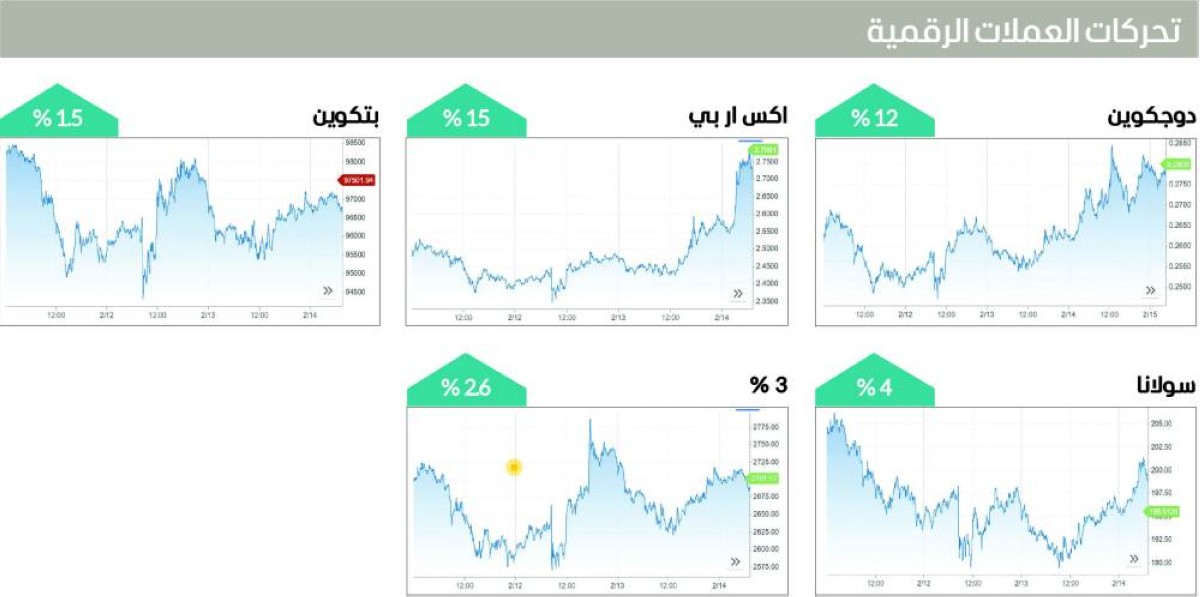The Global Shift Towards Cryptocurrency Regulations
Cryptocurrency markets are experiencing significant changes, with rising market values and new regulatory recommendations, leaving investors and policymakers at a crossroads.
Published February 17, 2025 - 00:02am

Image recovered from albayan.ae
The cryptocurrency market has recently witnessed dramatic developments, characterized by substantial increases in its global market capitalization. As of the end of the second week of February, the market surged by an impressive 7%. This uptick was largely driven by several favorable developments and the mitigation of earlier concerns related to potential tariff threats from former U.S. President Donald Trump.
Bitcoin, the predominant digital currency, registered a gain of approximately 1.5%, elevating its price to levels above $97,000. This marked an improvement from prices hovering around $96,000 at the close of the first week of February. Meanwhile, Ethereum, often considered the second-in-command in the crypto world, saw its value climb by 3%, closing the week near $2,720, a rise from $2,640 observed the previous week.
The week also spotlighted how the cryptocurrency markets have reacted to macroeconomic factors such as the U.S. inflation data released that Wednesday. The higher-than-expected inflation figures initially triggered sharp declines in both cryptocurrencies and traditional stocks. However, crypto assets managed to recover these losses in the subsequent days, underscoring their fluctuating nature.
Solana, another significant player in the crypto space, witnessed a 4% growth, ending the week at roughly $197, in contrast to its sub-$190 status earlier in the month. Similarly, Dogecoin and XRP showed strong performances, with the former appreciating by 12% and the latter by 15%, finishing at $2.75, up from $2.3. A notable development was the SEC's formal approval of Grayscale's request for the first-ever spot trading fund for XRP, suggesting a potential reshaping of the digital asset investment landscape.
The international crypto markets have been vigilant about the activities of key players in the industry. Specifically, Coinbase, a major cryptocurrency exchange, posted its highest quarterly revenue in three years during Q4 of 2024. Their earnings per share reached $4.68 compared to the expected $1.81, while revenue totaled $2.27 billion, surpassing predictions of $1.88 billion. These results were buoyed by the rising prices of cryptocurrencies following Trump's entry into the White House.
In parallel, Robinhood, another financial services firm, hit record earnings, fueled by a frenzy in both stock and crypto markets post-Trump's electoral victory and his open support for the crypto market. Robinhood reported an impressive 700% increase in crypto revenue, reaching $358 million, which contributed to their overall revenue spike of 115%, translating to $1.01 billion.
While the United States navigates the intricacies of these expanding crypto markets, Morocco is grappling with the legal void surrounding digital currencies. A French study by HelloSafe stressed the urgency for Morocco to expedite its crypto legislation. Approximately 16% of Moroccans, equivalent to 6 million people, own digital currencies, yet these transactions currently occur beyond the legal framework, given the Moroccan central bank's 2017 ban on crypto. This prohibition has not only limited economic potential but also placed millions in legally ambiguous situations.
Moroccan experts argue that ignoring the prevalence of digital currencies could hinder national economic gains and maintain a large section of the populace in an unlawful state. Cryptos offer a cost-effective alternative for international transactions, aligning with global trends that increasingly embrace such financial instruments. The legislative process, supported by both the World Bank and the International Monetary Fund, is underway to provide a regulatory framework for these activities.
The Bank of Morocco's governor has confirmed that a draft bill regulating virtual currencies is nearly complete. Despite previous prohibitions, Morocco has seen a significant, largely youth-driven growth in informal crypto trading. This regulatory move aims not only to legitimize and streamline market activities but also to introduce a taxation regime that could bolster state revenues.
By organizing the crypto domain, Morocco hopes to open economic opportunities and incorporate a taxation system for crypto dealings, aligning itself as one of the pioneering countries in establishing a clear regulatory environment for digital currency transactions. Both the United States and Morocco exemplify global trends where cryptocurrency regulation and market expansion converge, reflecting the growing significance and complexity of this digital asset class.







